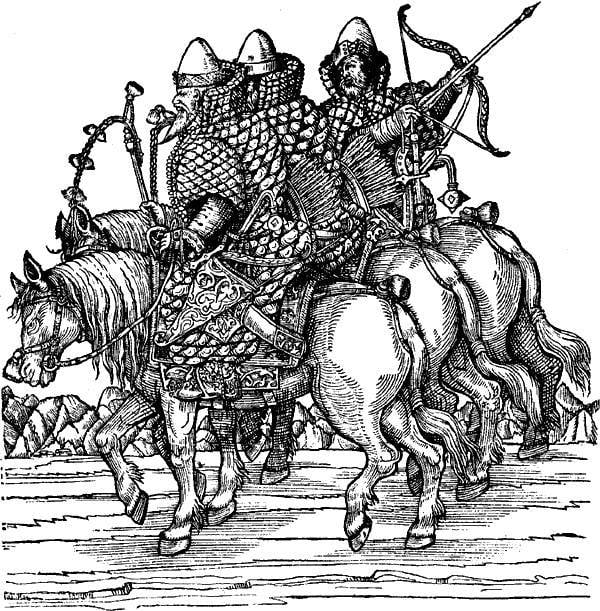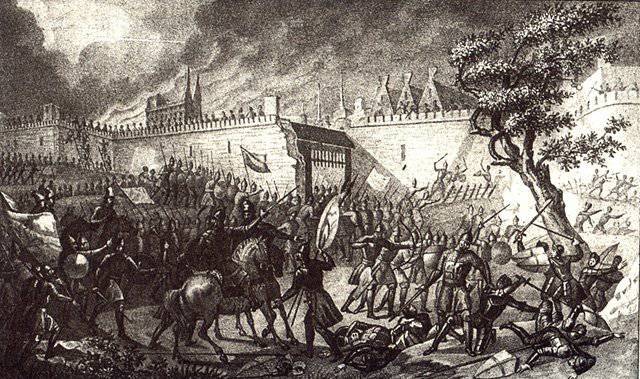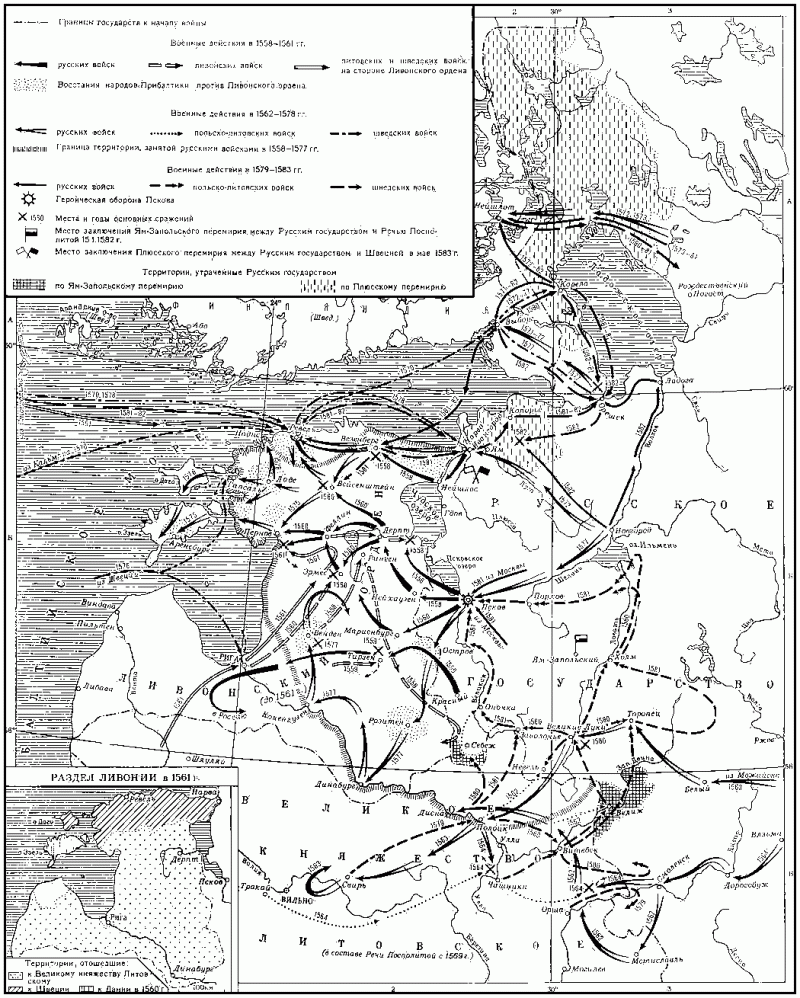Victory and defeat of the Livonian War
Some researchers rightly believe that the most promising direction of expansion of the Russian state in this period was the southern one. So, even N. I. Kostomarov noted that "Time showed all the unreasonable behavior of Tsar Ivan Vasilyevich towards the Crimea." Moscow did not take advantage of the moment of extreme weakening of Bakhchisarai, allowing him to recover and not crush the enemy, after the conquest of Kazan and Astrakhan. G.V. Vernadsky emphasized that the war with the Crimean Tatars was a “truly national task” and, despite the difficulty of conquering the Crimea, in comparison with the Kazan and Astrakhan khanates, it was quite doable. The Livonian War, a campaign that at the beginning was considered an easy task, with the aim of defeating the Livonian Order that had lost its military might, prevented the realization of this task. “The real dilemma that Tsar Ivan IV confronted,” wrote George Vernadsky, “was not to choose between the war only with the Crimea and the march on Livonia, but the choice between the war only with the Crimea and the war on two fronts with both the Crimea and Livonia. Ivan IV chose the latter. The results were terrifying. ” The historian suggested that the Russian army originally sent to Livonia was intended to fight the Crimean Khanate. That is why, it was headed by the service Tatar "princes" - Shah-Ali, Kaibula and Tokhtamysh (Moscow candidate for the Crimean throne), the troops were staffed largely from Kasimov and Kazan Tatars. Only at the last moment the army turned to the north-west.
It is possible that the Moscow government was confident in the short campaign against Livonia. Having achieved great foreign policy successes - having conquered Kazan and Astrakhan, the Russian government decided to subjugate the Livonian Order and firmly stand on the shores of the Baltic Sea. The Livonian Order being an ally of Svidrigaylo Olgerdovich 1 September 1435 suffered a terrible defeat in the battle of Vilkomir (Magister Kerskorf, land marshal and most of the Livonian knights died), after which an agreement was signed on the creation of the Livonian Confederation. 4 December 1435 of the year the Confederation included the archbishop of Riga, the bishops of Courland, Derpt, Ezel-Vic, and Revel, as well as the Livonian Order, its vassals and the cities of Riga, Revel and Dorpat. This loose state formation was under the strong influence of its neighbors, including the Russian state.
The moment chosen for the start of hostilities against Livonia seemed quite successful. The consistent and old enemies of Russia, who opposed the strengthening of its positions on the shores of the Baltic, could not provide the Livonian Confederation with emergency military assistance. The Swedish kingdom was defeated in the war with the Russian state - the Russian-Swedish war 1554 — 1557. This war revealed the undoubted superiority of the Russian army, although it did not lead to great results. King Gustav I, after an unsuccessful attempt to seize the fortress Oreshek, defeat Kivinebba and the siege of Russian troops in Vyborg, hastened to conclude an armistice. 25 March 1557 was signed by the Second Novgorod Truce for a period of forty years, which confirmed the territorial status quo and the tradition of diplomatic relations through the Novgorod governor. Sweden needed a peaceful respite.
The governments of Lithuania and Poland hoped that the Livonian knights themselves would be able to fight back the Russians. In addition, the process of merging Lithuania and Poland into a single state has not yet been completed, which weakened them. Intervention in the war of Livonia and Russia, gave all the benefits of Sweden, Poland's rival in the region. Bakhchisarai, frightened by the previous victories of Moscow, was not going to start a large-scale war, took a wait-and-see attitude, confining himself to the usual small raids.
However, the decisive success of the Russian troops in the war with Livonia, caused the consolidation of the enemies of Moscow. In place of the quivering troops of the Order, the troops of Sweden and Lithuania, and then of Poland, moved. The war reached a new level, when a powerful coalition began to confront the Russian state. At the same time, we must remember that only we possess complete information. The Moscow government, starting the war, thought that everything would end in a short time, the Livonians, frightened by the might of the Russian army, would go on negotiations. All previous conflicts with Livonia also spoke about this. It was believed that there was no reason for war with a coalition of strong European states. Similar local conflicts, of frontier significance, have been dozens in Europe.
Casus belli
The reason for the war with Livonia was the fact that Livonians did not pay the old “Yuryev Dani” - a monetary compensation for Germans settled in the Baltic States for the right to settle on the lands along the Western Dvina River and belonged to the Polotsk princes. Later, these payments turned into a very significant tribute to the Russian city of Yuryev (Dorpat) captured by the German knights. Livonia recognized the validity of this compensation in the 1474, 1509 and 1550 agreements.
In 1554, at the negotiations in Moscow, representatives of the Order - Johann Bokgorst, Otto von Grothuzen, and Bishop of Dorpat - Waldemar Wrangel, Diederick Carpet, agreed with the arguments of the Russian side. Russia was represented by Alexey Adashev and Ivan Viskovaty. Livonia pledged to pay tribute to the Russian sovereign with three years' arrears of three marks "from each head." However, to collect so much a significant amount - 60 thousand brands Livonians did not have time (or rather especially, and did not rush). Other demands of the Russian government were also unfulfilled - the restoration of the Russian quarters (“ends”) and Orthodox churches in Riga, Reval and Dorpat, the provision of free trade for Russian “guests” and the abandonment of allied relations with Sweden and Lithuania. Livonians directly violated one of the points of the agreement with Moscow, concluding in September 1554, an alliance with the Grand Duchy of Lithuania, which was directed against Russia. Learning of this, the Russian government sent a diploma to declare war to Magister Johann Wilhelm von Fürstenberg. In 1557, in the town of Posvol, an agreement was concluded between the Livonian Confederation and the Polish Kingdom, which established the vassal dependence of the Order on Poland.
However, immediately full-scale hostilities did not begin. Ivan Vasilievich was still hoping to achieve his goals by diplomatic means. Up until June 1558, negotiations were held in Moscow. Nevertheless, violations by the Livonians of the 1554 agreement of the year gave the Russian government a reason to increase pressure on the Order. It was decided to carry out a military action in order to intimidate the Livonians in order to make them more compliant. The main objective of the first campaign of the Russian army, which took place in the winter of 1558, was the desire to achieve a voluntary rejection of Narva (Rougodiva) by the Livonians. To this end, the cavalry army, already mobilized, ready for war with the Crimean Khanate, was transferred to the borders with the Livonian Confederation.
The beginning of the war. War with the Livonian Confederation
First hike. Winter campaign 1558 of the year. In January 1558, Moscow horse regiments led by Kasimov's “king” Shah-Ali and Prince Mikhail Glinsky invaded Livonia and rather easily passed the eastern regions. During the winter campaign 40-th. The Russian-Tatar army reached the coast of the Baltic Sea, ravaging the environs of many Livonian cities and castles. The task of mastering the Livonian fortifications was not posed. This raid was a frank demonstration of the power of the Russian state, designed to exert a psychological effect on the order authorities. During this campaign, Russian commanders twice, at the direction of the emperor Ivan Vasilyevich, sent letters to the master of Livonian to send ambassadors to resume the negotiation process. Moscow did not want to wage a serious war in the north-west; it was enough for it to fulfill the agreements already reached.
Livonian authorities, frightened by the invasion, have accelerated the collection of tribute, agreed to a temporary suspension of hostilities. Diplomats were sent to Moscow and during the difficult negotiations, an agreement was reached on the transfer of Narva to Russia.

Second hike. But the established truce did not last long. Livonian supporters of the war with Russia broke the peace. In March 1558, the Narva vogt Ernst von Schnellenberg ordered the shelling of the Russian fortress Ivangorod, which provoked a new invasion of Russian troops in Livonia. This time the blow was more powerful and Russian troops captured fortresses and castles. The Russian army was strengthened by the forces of the governor Alexei Basmanov and Daniil Adashev, artillery, including heavy, for the destruction of fortifications.
In the spring and summer of 1558, the Russian regiments seized 20 fortresses, including voluntarily capitating and entering the citizenship of the Russian tsar. In April, Narva was besieged on 1558. For quite a long time the fighting near the city was limited only by artillery fire. Everything changed on May 11, a large fire broke out in Narva (possibly caused by Russian artillery fire), a significant part of the Livonian garrison was sent to fight the fire, at that time the Russian soldiers broke the gate and captured the lower city, many Germans were killed. Livonian guns were sent to the upper castle, shelling began. The besieged, realizing that their position was hopeless, capitulated on the condition of free exit from the city. The 230 of large and small guns and a lot of squeals became trophies of the Russian army. The remaining residents of the city took the oath of allegiance to the Russian sovereign.
Narva was the first major Livonian fortress that Russian troops took in the Livonian War. Having seized the fortress, Moscow received a convenient seaport through which direct trade relations with the countries of Western Europe became possible. In addition, in Narva, work began on the creation of Russian fleet - A shipyard was built in which craftsmen from Kholmogory and Vologda worked. A squadron of 17 vessels was subsequently based in the harbor of Narva under the command of a German, Danish national Karsten Rode, who was accepted into the Russian service. This was a talented captain with a very interesting fate, more in the article IN: First Russian Fleet - Pirates of the Terrible Tsar. Ivan Vasilievich sent a Novgorod bishop to the city with the task of consecrating Narva and starting the construction of Orthodox churches. Narva remained Russian until 1581 (it was captured by the Swedish army).
For several weeks, the small but strong Neuhausen fortress held its defenses. Several hundred soldiers and peasants, led by the knight von Padenorm, repelled the onslaught of the troops under the command of commander Peter Shuisky. 30 June 1558, the Russian artillery completed the destruction of the external fortifications, and the Germans retreated to the upper castle. After that, the people refused to continue the senseless resistance and capitulated. Shuisky, as a sign of their courage, let them go with honor.
After the capture of Neuhausen, Shuisky besieged Dorpat. He was defended by the 2 thousand garrison of German mercenaries ("overseas Germans") and local residents under the authority of Bishop Hermann Weyland. For the shelling of the city, Russian troops built a high wall, raising it to the level of the walls, which allowed shelling the entire Derpt. For several days there was a strong bombardment of the city, several fortifications were destroyed, many houses. On July 15, royal voivod Shuisky suggested Weyland capitulate. While he was pondering, the bombing continued. In the siege of Dorpat, the Russian artillerymen for the first time used incendiary projectiles - “fiery coolies”. Having lost all hope of outside help, the townspeople decided to begin negotiations with the Russians. Peter Shuisky promised not to destroy Dorp to the ground and to keep the former administration to the citizens. 18 July 1558 city capitulated.
In Dorpat, in one of the caches, Russian warriors discovered 80 thousand thalers, which exceeded Livonia’s entire debt to Russia. As a result, the inhabitants of Dorpat, due to the greed of some citizens, lost more than the Russian sovereign demanded from them. The money found would be enough not only for the Yuryev tribute, but also for hiring troops to defend Livonia. In addition, the winners captured 552 large and small guns.

Capture of Narva by Ivan the Terrible. B. A. Chorikov, 1836.
Attempt Livonian counteroffensive. During the summer campaign 1558, Russian forward detachments reached Revel and Riga, ravaging their surroundings. After such a successful campaign, Russian troops left Livonia, leaving small garrisons in the captured cities and castles. This decided to take advantage of the new energetic Livonian deputy master, former commander Fellin Gothard (Gotthard) Ketler. Deputy Master collected 19-thousand. army: 2 thousand cavalry, 7 thousand knights, 10 thousand militia.
Kettler wanted to recapture the lost eastern lands, primarily in the Dorpat bishopric. Livonian troops approached Ringen (Ryngola) fortress, which was defended by the garrison of all 40 "sons of boyars" and 50 archers under the leadership of voivode Rusin-Ignatieff. Russian warriors put up heroic resistance, repulsing the onslaught of the enemy army during 5 weeks (according to other sources - 6 weeks). They repelled two general assaults.
Ringen's garrison tried to help out a 2-th sent to the aid detachment under the command of voivod Michael Repnin. The Russian warriors were able to smash the front guard of the Livonians; a 230 man was captured along with their commander Johann Kettler (brother of the commander). But then the detachment of Repnin was attacked by the main forces of the Livonian army and defeated. This failure did not shake the courage of the defenders of the fortress, they continued to defend themselves.
The Germans were able to capture Ryngola only during the third assault, which lasted three days, after the defenders had finished gunpowder. Those warriors who did not fall in a fierce battle, Livonians finished off. Ketrel lost a fifth of the troops near Ringen - about 2 thousand people and spent six months on the siege. After that, the offensive outburst of the Livonian troops died away. Livonians at the end of October 1558 were only able to organize a raid on foreign places of Pskov. The Livonian troops ravaged the Monastery of St. Nicholas near Sebezh and the suburbs of the town of Krasnoye. Then the Livonian army retreated to Riga and Wenden.
Winter campaign 1558-1559's. The Livonian offensive and the destruction of the Pskov sites provoked great anger among the Russian sovereign. Measures were taken to retaliate. Two months later, troops under the leadership of Seeds Mikulinsky and Peter Morozov entered Livonia. They devastated southern Livonia within a month.
17 January 1559, the decisive battle took place at the city of Thirsen. A large Livonian detachment under the command of Friedrich Felkerzam (Felkensam) was confronted by the Advanced Regiment led by voivode Basil the Silver. In a bitter struggle, the Livonians were defeated. Felkers and 400 his soldiers died, the rest were captured or fled. This victory gave into the hands of the Russian army vast territories. Russian troops freely raided the lands of the Livonian Confederation, passing "on both sides of the Dvina", capturing 11 cities and castles. Russian reached Riga, stood here for three days. Then they came to the border with Prussia, and only in February returned to the Russian borders with big booty and significant numbers. In addition, the Riga fleet was burned in the Dunamünm raid.
1559 Truce of the Year
After such a successful campaign, the Russian government granted the Livonian Confederation a truce (the third in a row) from March to November 1559. Moscow was confident that the situation in the newly-conquered cities was firm and, under the mediation of the Danes, went on a truce. In addition, Moscow was under strong diplomatic pressure, worried about Russian successes, Lithuania, Poland, Sweden and Denmark. Thus, the Lithuanian ambassadors urged Tsar Ivan IV to end the war in Livonia, threatening, otherwise, to side with the Livonian Confederation. Soon the Swedish and Danish envoys handed over a request to stop the war. Russian successes upset the balance of power in Europe, in the Baltic, and affected the political and economic interests of a number of powers. The Polish king Sigismund II Augustus even complained about the Russians to the English Queen Elizabeth I: “The Moscow monarch daily increases his power by purchasing goods that are brought to Narva, because here, among other things, weapon, still not known to him ... military experts come, through which he acquires the means to defeat all ... ”. There were supporters of a truce in Moscow. Okolnichy Alexey Adashev expressed the interests of the party, which insisted on the continuation of the struggle in the south, against the Crimea.
To be continued ...

Information